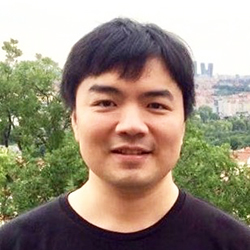Related Research Articles

Carnegie Mellon University (CMU) is a private research university in Pittsburgh, Pennsylvania. The institution was originally established in 1900 by Andrew Carnegie as the Carnegie Technical Schools. In 1912, it became the Carnegie Institute of Technology and began granting four-year degrees. In 1967, it became the current-day Carnegie Mellon University through its merger with the Mellon Institute of Industrial Research, founded in 1913 by Andrew Mellon and Richard B. Mellon and formerly a part of the University of Pittsburgh.

The School of Computer Science (SCS) at Carnegie Mellon University in Pittsburgh, Pennsylvania, US is a school for computer science established in 1988. It has been consistently ranked among the top computer science programs over the decades. As of 2022 U.S. News & World Report ranks the graduate program as tied for second with Stanford University and University of California, Berkeley. It is ranked second in the United States on Computer Science Open Rankings, which combines scores from multiple independent rankings.

Dabbala Rajagopal "Raj" Reddy is an Indian-born American computer scientist and a winner of the Turing Award. He is one of the early pioneers of artificial intelligence and has served on the faculty of Stanford and Carnegie Mellon for over 50 years. He was the founding director of the Robotics Institute at Carnegie Mellon University. He was instrumental in helping to create Rajiv Gandhi University of Knowledge Technologies in India, to cater to the educational needs of the low-income, gifted, rural youth. He is the chairman of International Institute of Information Technology, Hyderabad. He is the first person of Asian origin to receive the Turing Award, in 1994, known as the Nobel Prize of Computer Science, for his work in the field of artificial intelligence.

Carnegie Mellon Silicon Valley is a degree-granting branch campus of Carnegie Mellon University located in the heart of Silicon Valley in Mountain View, California. It was established in 2002 at the NASA Ames Research Center in Moffett Field.

David S. Touretzky is a research professor in the Computer Science Department and the Center for the Neural Basis of Cognition at Carnegie Mellon University. He received a BA in Computer Science at Rutgers University in 1978, and earned a master's degree and a Ph.D. (1984) in Computer Science at Carnegie Mellon University. Touretzky has worked as an Internet activist in favor of freedom of speech, especially what he perceives as abuse of the legal system by government and private authorities. He is a notable critic of Scientology.

Luis von Ahn is a German-Guatemalan entrepreneur and a consulting professor in the Computer Science Department at Carnegie Mellon University in Pittsburgh, Pennsylvania. He is known as one of the pioneers of crowdsourcing. He is the founder of the company reCAPTCHA, which was sold to Google in 2009, and the co-founder and CEO of Duolingo.

Jaime Guillermo Carbonell was a computer scientist who made seminal contributions to the development of natural language processing tools and technologies. His extensive research in machine translation resulted in the development of several state-of-the-art language translation and artificial intelligence systems. He earned his B.S. degrees in Physics and in Mathematics from MIT in 1975 and did his Ph.D. under Dr. Roger Schank at Yale University in 1979. He joined Carnegie Mellon University as an assistant professor of computer science in 1979 and lived in Pittsburgh from then. He was affiliated with the Language Technologies Institute, Computer Science Department, Machine Learning Department, and Computational Biology Department at Carnegie Mellon.

Kathleen M. Carley is an American computational social scientist specializing in dynamic network analysis. She is a professor in the School of Computer Science in the Carnegie Mellon Institute for Software Research at Carnegie Mellon University and also holds appointments in the Tepper School of Business, the Heinz College, the Department of Engineering and Public Policy, and the Department of Social and Decision Sciences.

Google Flu Trends (GFT) was a web service operated by Google. It provided estimates of influenza activity for more than 25 countries. By aggregating Google Search queries, it attempted to make accurate predictions about flu activity. This project was first launched in 2008 by Google.org to help predict outbreaks of flu.

Ziv Bar-Joseph is an Israeli computational biologist and Professor in the Computational Biology Department and the Machine Learning Department at the Carnegie Mellon School of Computer Science.

Eric Poe Xing is an American computer scientist, academic administrator, and entrepreneur. Prior to his appointment as President of MBZUAI, Xing was a professor in the School of Computer Science at Carnegie Mellon University and researcher in machine learning, computational biology, and statistical methodology. Xing is also the Founder, Chairman, Chief Scientist, and former CEO of Petuum Inc.

The Computational Biology Department (CBD) is a division within the School of Computer Science at Carnegie Mellon University in Pittsburgh, Pennsylvania, United States. It is located in the Gates-Hillman Center. Established in 2007 by Robert F. Murphy as the Lane Center for Computational Biology with funding from Raymond J. Lane and Stephanie Lane, CBD became a department within the School of Computer Science in 2016.

Chris Harrison is a British-born, American computer scientist and entrepreneur, working in the fields of human–computer interaction, machine learning and sensor-driven interactive systems. He is a professor at Carnegie Mellon University and director of the Future Interfaces Group within the Human–Computer Interaction Institute. He has previously conducted research at AT&T Labs, Microsoft Research, IBM Research and Disney Research. He is also the CTO and co-founder of Qeexo, a machine learning and interaction technology startup.
Geoffrey J. Gordon is a professor at the Machine Learning Department at Carnegie Mellon University in Pittsburgh and director of research at the Microsoft Montréal lab. He is known for his research in statistical relational learning and on anytime dynamic variants of the A* search algorithm. His research interests include multi-agent planning, reinforcement learning, decision-theoretic planning, statistical models of difficult data, computational learning theory, and game theory.

Jian Ma is an American computer scientist and computational biologist. He is the Ray and Stephanie Lane Professor of Computational Biology in the School of Computer Science at Carnegie Mellon University. He is a faculty member in the Computational Biology Department. His lab develops machine learning algorithms to study the structure and function of the human genome. During his Ph.D. and postdoc training, he developed algorithms to reconstruct the ancestral mammalian genome. His research group has recently pioneered a series of new machine learning methods for 3D epigenomics and spatial genomics. He received an NSF CAREER award in 2011. In 2020, he was awarded a Guggenheim Fellowship in Computer Science. He is an elected Fellow of the American Association for the Advancement of Science. He leads an NIH 4D Nucleome Center to develop machine learning algorithms to better understand the cell nucleus.

Hideto Tomabechi is a Japanese cognitive scientist computer scientist.
Maria-Florina (Nina) Balcan is a Romanian-American computer scientist whose research investigates machine learning, algorithmic game theory, theoretical computer science, including active learning, kernel methods, random-sampling mechanisms and envy-free pricing. She is an associate professor of computer science at Carnegie Mellon University.
Shirley Ho is an American astrophysicist and machine learning expert, currently at the Center for Computational Astrophysics at Flatiron Institute in NYC and at the New York University and the Carnegie Mellon University. Ho also has visiting appointment at Princeton University.
Cleotilde Gonzalez is a Research Professor of Decision Sciences in the Social and Decision Sciences Department. She is also the founding director of the Dynamic decision-making laboratory at Carnegie Mellon University. Gonzalez is also affiliated with the Security and Privacy Institute (CyLab), the Center for Behavioral Decision Research (CBDR), the Human Computer Interaction Institute, the Center for Cognitive Brain Imaging, and the Center for Neural Basis of Cognition.
Elizabeth A. Holm is a materials scientist at Carnegie Mellon University, working on computational materials. She worked at Sandia National Laboratories for 20 years before joining the faculty of Carnegie Mellon in 2012. She is a Fellow of The Minerals, Metals & Materials Society and Fellow of ASM International. She was the 2013 President of the society. She is internationally known for her theory and modeling work on microstructural response, interfaces, carbon nanotubes, and additive manufacturing.
References
- 1 2 "Carnegie Mellon Names Rosenfeld Head of Machine Learning Department - Machine Learning". Machine Learning | Carnegie Mellon University. Retrieved 2019-11-10.
- ↑ "Roni Rosenfeld - Google Scholar Citations". scholar.google.com. Retrieved 2019-11-09.
- ↑ "Statistical Language Modeling Toolkit".
- ↑ "The CMU SLM Toolkit".
- ↑ Rosenfeld, Ronald (July 1996). "A maximum entropy approach to adaptive statistical language modelling". Computer Speech & Language. 10 (3): 187–228. doi:10.1006/csla.1996.0011.
- ↑ "Roni Rosenfeld: Publication List". www.cs.cmu.edu. Retrieved 2019-11-10.
- 1 2 3 http://www.cs.cmu.edu/~roni/Rosenfeld-CV-Long.pdf [ bare URL PDF ]
- ↑ "Roni Rosenfeld's Home Page".
- ↑ "Joint/Adjunct Faculty | Computational & Systems Biology" . Retrieved 2019-11-10.
- ↑ "Machine Learning for Social Good | Carnegie Mellon Office of Admission". admission.enrollment.cmu.edu. Retrieved 2019-11-10.
- ↑ "Roni Rosenfeld". 15 October 2015.
- ↑ EST, Kate Sheridan On 12/21/17 at 3:41 PM (2017-12-21). "Cloudy with a chance of influenza: can we predict the flu like we predict the weather?". Newsweek. Retrieved 2019-11-10.
- ↑ "DELPHI - Epi Forecasting". delphi.midas.cs.cmu.edu. Retrieved 2019-11-10.
- ↑ "New Flu Activity Forecasts Available for 2016-17 Season; CDC Names Most Accurate Forecaster for 2015-16 Error processing SSI file". www.cdc.gov. 2017-04-07. Retrieved 2019-11-10.
- ↑ "FluSight: Flu Forecasting | CDC". www.cdc.gov. 2019-10-15. Retrieved 2019-11-10.
- ↑ "CDC Says Carnegie Mellon's Flu Forecasts Once Again Most Accurate - News - Carnegie Mellon University".
- ↑ Schmidt, Charles (18 September 2019). "Real-time flu tracking". Nature. 573 (7774): S58–S59. Bibcode:2019Natur.573S..58S. doi: 10.1038/d41586-019-02755-6 . PMID 31534256.
- ↑ "FluSight: Flu Forecasting | CDC". www.cdc.gov. 2019-12-11. Retrieved 2019-12-14.
- ↑ "CDC Funds Carnegie Mellon's Flu Forecasting Center | CMU". www.cmu.edu. 2019-10-08. Retrieved 2019-11-10.
- ↑ "CMU Statistics". www.stat.cmu.edu. Retrieved 2019-11-10.
- ↑ "Past Recipients - SCS Business Office - Carnegie Mellon University".
- ↑ "New Flu Activity Forecasts Available for 2016-17 Season; CDC Names Most Accurate Forecaster for 2015-16 | CDC". 13 November 2019.
- ↑ "FluSight: Flu Forecasting". 27 February 2020.
- ↑ "The Allen Newell Award for Research Excellence - Previous Winners". 4 October 2013.